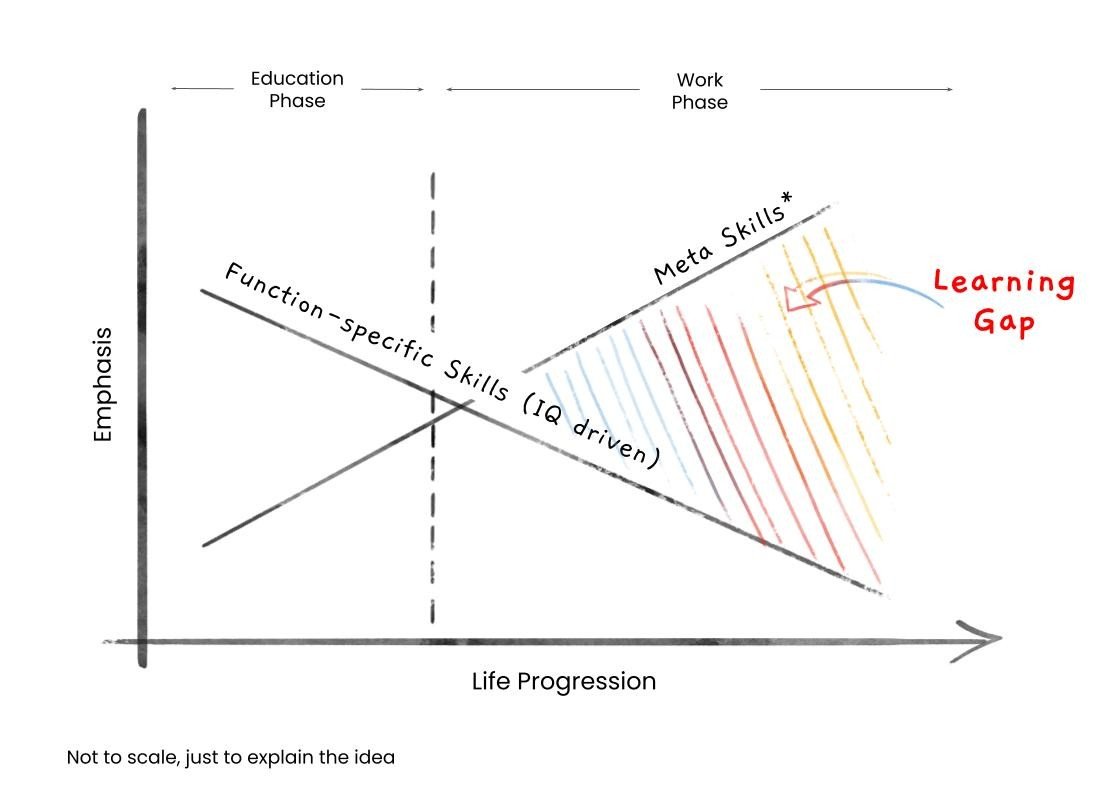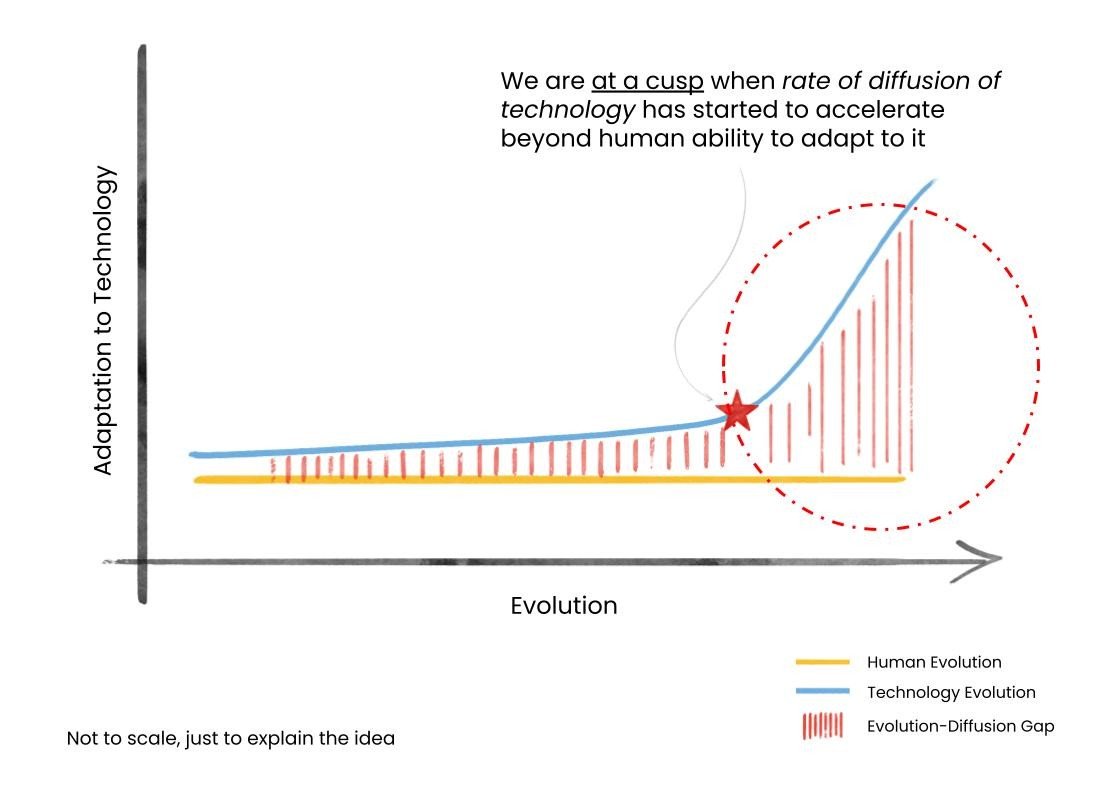The Learning Gap
Future generations will need a different 'system'
(Article 1 of 4)
A PERSONAL STORY
My dad wanted to become a psychiatrist. Despite odds he found his way to a medical school, became one, worked all his life for a single organisation, and retired. This was a generation of single ambition, single education, single skill, single profession and single organisation.
My son (now he is 20 years of age and studying in University of British Columbia, Vancouver) is quite good at beatboxing among his other talents. A couple of years ago he came to me and said, “Papa, I am considering becoming a ‘professional vocal percussionist’”.
My response was ‘WHAT’! I countered, “Hey son, if not engineering or design can you at least consider psychology (as your professional study - and eventually a traditional career as opposed to being a ‘professional vocal percussionist’). He did. But only in the first semester of his undergrad school. He didn’t find psychology in first semester challenging enough (partly because he had studied psychology for two years in his high school, had done a few internships related to psychology and also had ‘educated’ himself in concepts of psychology through self learning before he joined his Bachelor's programme).
In his next two semesters he picked up Linguistics, Japanese and Kinesiology, and finally settled for Philosophy as his major fourth semester onwards.
In addition he has a small AI automation startup with his 16 years young cousin (who has self taught himself coding while opting to study commerce in high school) and helping his friend in his ed tech venture.
On top of that this summer holiday he took a summer job selling solar panels to households in Calgary, his logic, “to hone my persuasion and sales skills by talking to and convincing strangers”.
This is the generation of today, leading our way into the future. This generation will have multiple ambitions, multiple educations, multiple skills, multiple and parallel professions and many or no organisations. Is our education system, our work system and our society and norms ready for this generation?
THE LEARNING GAP
In our current education system the emphasis is to train people in ‘Function Specific Skills’, and assess them through the lens of a limited view of intelligence, generally measured by IQ* (Intelligence quotient) and then push them into the ‘work world’. But in the ‘work world’ you don’t just require your ‘Function Specific kills. You need more than that.
MetaSkills become more valuable as life progresses
For example, when a ‘software programmer’ or an ‘electrical engineer’ or a ‘designer’ joins workforce you are not just supposed to write code for software or design circuits or make logos, you are also supposed to collaborate and work along with other people, which entails giving and taking feedback for your work and conduct, work with people of other complementary skills, work towards team or company goals and more. Though you were hired mainly for your ‘Function Specific Skill’ you are now also expected to exercise skills that you were not formally trained in. Driven by the uni-dimensional view of intelligence, the primary emphasis of our formal education system remains on ‘Function Specific Skills’.
Our society and economy seem to be functioning on one leg
The ‘learning gap’ in our education system has led to a ‘skills gap’ in our workforce. It seems that our ‘work’ world is running on one leg (‘Function Specific Skills’). The other leg (MetaSkills) is tied. Our society and economy is running on half of human potential.
Can we fix our cart? (cart of social, economic and educational system)
Another metaphor to understand the gravity of the gap is a two-wheel cart, where one wheel is either missing or broken. This is bound to make our journey as human civilisation inefficient and dangerous.
[I am not arguing against the mastering or acquiring ‘Function Specific Skills’. These skills can give you a good entry point into your professional career. It helps to create focus. My argument is that ‘Function Specific Skills’ are not sufficient by themselves. One needs to equally focus on and train and assess oneself on MetaSkills to be successful in the longer term.]
--------
[*IQ measures one dimension of our mental ability. It had its use. Before IQ became popular people had relied on intuitive assessments of how smart other people were. IQ tests made intelligence quantifiable. During World War I IQ tests were successfully used to test over one million American military recruits. (sourced & paraphrased from: Multiple Intelligences, New Horizons by Howard Gardner).
By the way I am not against measuring people for their IQs. My argument is that it does not give a complete picture of a person's intelligence. Our mental abilities have more than one dimension. There is more than one type of intelligence that contributes to a person's conduct and success in life.]
--------
Tech diffusion rate exacerbates the learning gap
The Learning gap is exacerbated by rapid cycles of change, and the exponential rate of technology diffusion. We are at a stage in human history where the rate of diffusion of tech is increasing much faster than biology and cognitive abilities of humans can easily adapt.
Diffusion of technology is faster than we can adapt
This is an unfamiliar terrain for humans because this time it is the battle of ‘mind’ (AI) and not just the battle of ‘muscle’ (machine power) which humans have so far harnessed to our advantage.
Battle of the mind, not just a battle of muscle with technology
Earlier generations had a lifetime to adapt to a new technology, now you need to adapt in a matter of weeks.
Does that put cognitive strain on the human brain?
Will our biological and cognitive makeup be able to adapt with the exponential advancement of technology?
There will be so much more to adapt, and at a much faster pace. We don’t have any previous (lived) experience of this. It is a test of human species!
In such a world where the future is uncertain and technology is unpredictable how shall we navigate into the rapidly unfolding future?
(I will delve more into these questions in my next article. Please stay tuned :)






